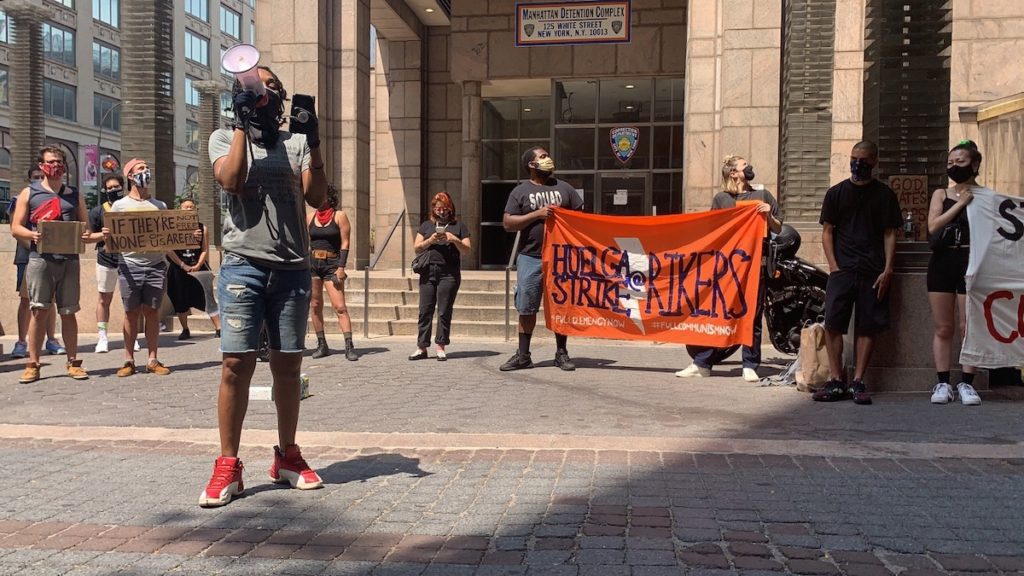Juneteenth is a holiday that marks the final end of chattel slavery in the United States, the announcement by Union army general Gordon Granger in Galveston, Texas, on June 19, 1865, that all slaves in Texas were free–some two years after the Emancipation Proclamation. This year, the holiday was celebrated in towns big and small with marches and rallies demanding an end to systemic racism and racist police terror.
In Chicago at least 1,000 gathered in the South Loop at 6 pm, followed by a march at 7:15 pm. The rally itself had powerful reception from the audience, and when it transitioned into the march the crowd’s noise often drowned out the bullhorns.
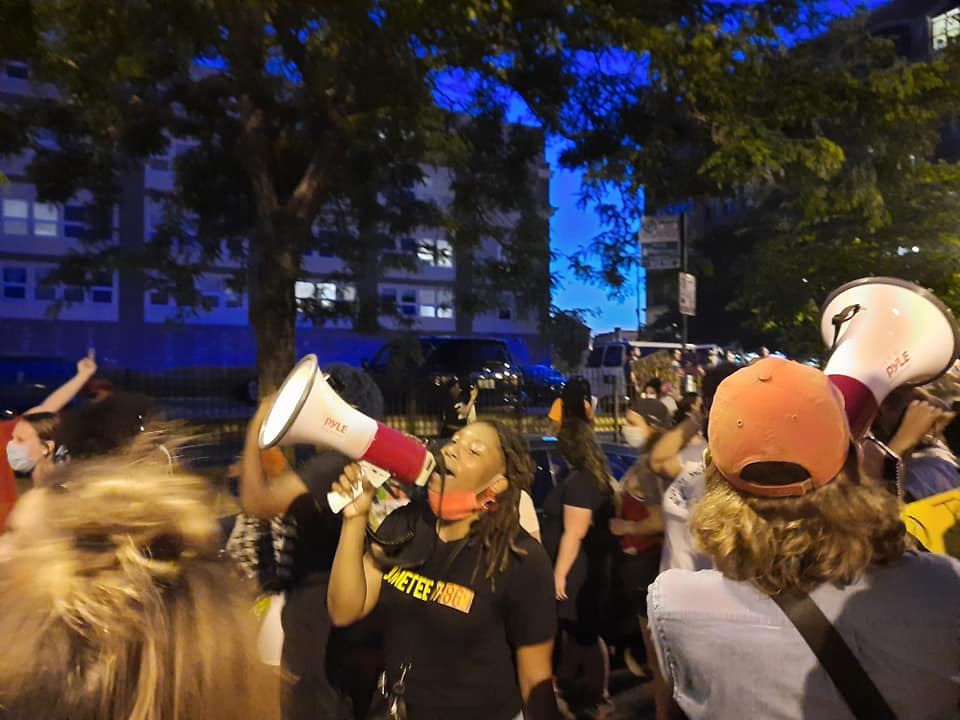
A popular chant that continued for a solid 8-10 minutes was “No justice, no peace – take it to the streets and f— the police.” Another powerful moment was taking over an intersection where a speaker lead the famous “it is our duty to fight for our freedom…” quote from Assata Shakur. It was easy to make out the visible frustration from the police, who were rarely in a mask. The march could not have possibly ended in a better way- fireworks, dancing, and cheering- and down State Street a very small march of kids only, chanting along “Black lives matter!”
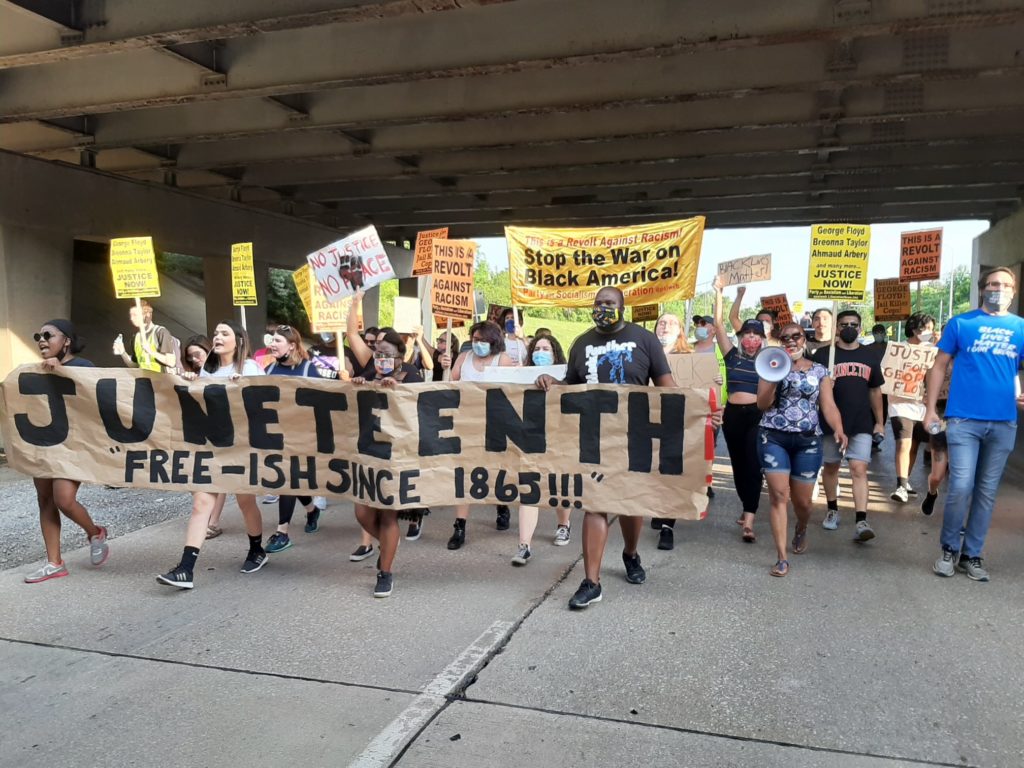
In Hazel Crest, Illinois, a predominantly Black suburb south of Chicago., around 50 people gathered to both celebrate the holiday and protest continuing racist injustice. At 6:00 pm, participants left a local park to begin a march and car caravan to the Cook County courthouse in the neighboring town of Markham. The march was able to take the major roads of the area, and was met with an overwhelming amount of love and support from the community. While occupying one intersection, workers and customers at a nearby strip mall left the building to cheer on the march with raised fists. Afterwards, Symone, one of the organizers of the march said, ‘The community was so supportive, which does not surprise me. The community was 100 percent behind us.”
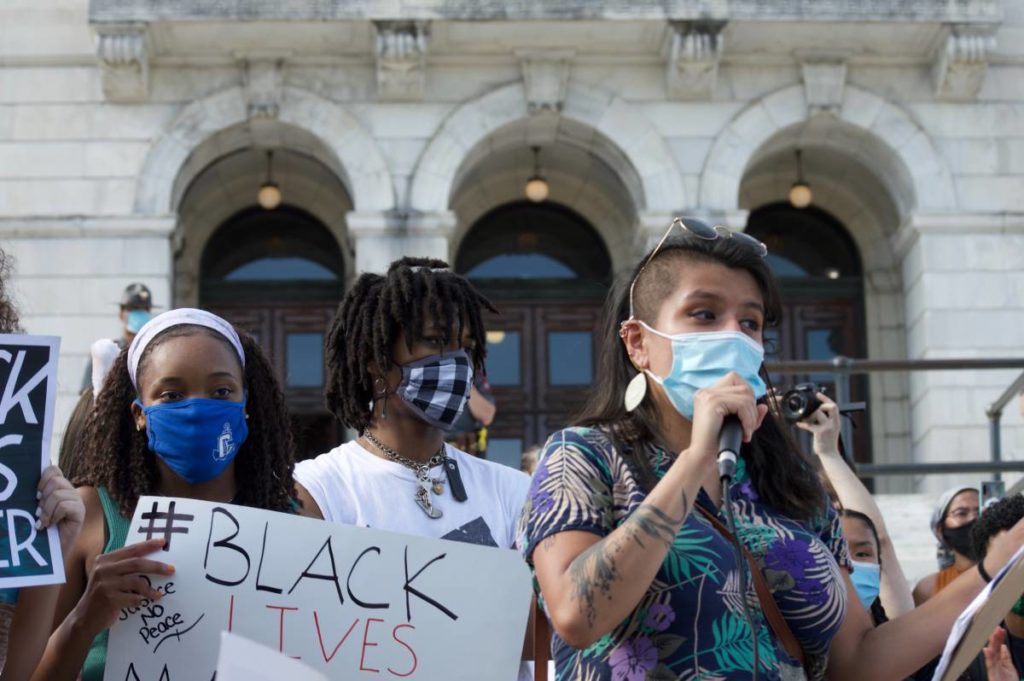
In Providence, Rhode Island, a march of 2,000 started at 4 pm from the Classical High School, passed through the Rhode Island Department of Education, and gathered in front of Rhode Island State House. The march was mostly led by youth–high school students many belonging to the class of 2020– organized by Direct Action for Rights and Equality, the Alliance of Rhode Island Southeast Asians for Education, Providence Student Union, Providence Youth Student Movement, and Leadership Journey. Many parents also joined along to show solidarity with the youth.
The leading slogan was “No justice no peace, take to the street to defund the police.” Vanessa Flores-Maldonado of Providence Youth Student Movement, the emcee, started with a clear agenda-setting line, “We are not here for reform. We are here to defund the police and then abolish the police.” Speakers talked about the history of Juneteenth, and the need for investing the community and not the police. Faith, a high school student, talked about the total lack of actual Black history (like Juneteenth) in the school curriculum. The event ended with a 8 minute, 46 second sit-in in memory of Geroge Floyd and the 123 people killed by the police since May 25.
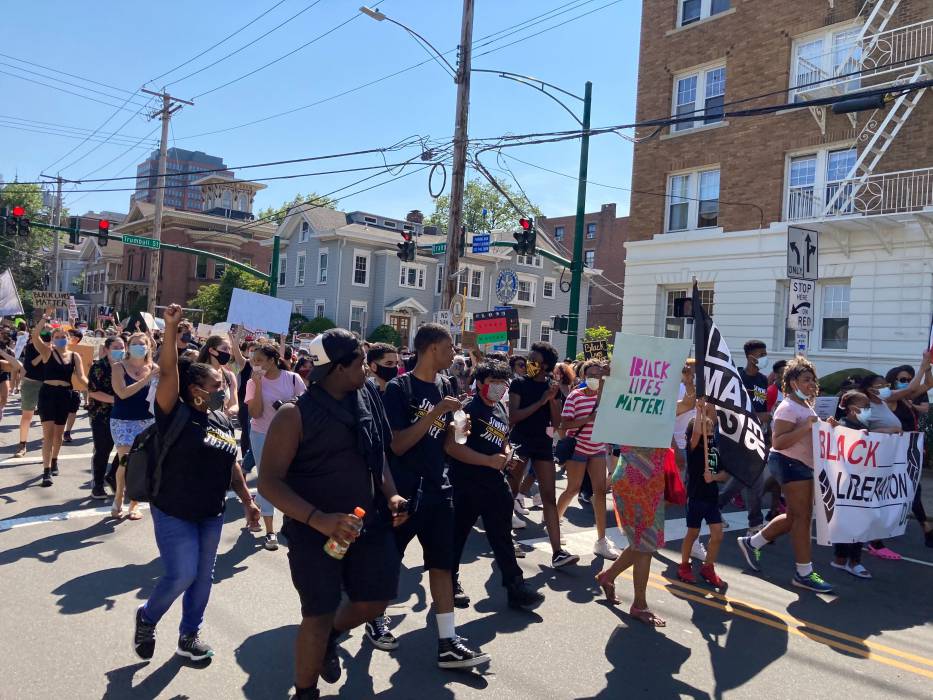
In New Haven, Connecticut, some 300 people marched in solidarity from the New Haven Green to East Rock Park, followed by a celebration of Black lives at East Rock Park. The march was led by youth organizers in the Citywide Youth Coalition and Students for Educational Justice along with People Against Police Brutality and Black Lives Matter New Haven. The action centered the demand for justice, the defunding of the police throughout the country, and culminated in a Juneteenth celebration in East Rock Park.
The message of the event was one of unity, resistance and joy. Marcy Jones led the crowd in singing the first two verses of “Lift Every Voice and Sing” and said of the people of the city, “New Haven is strong and people will come out for New Haven.” After weeks of protests, the opportunity to come together and celebrate victories was welcome.
Local activist Kerry Ellington reminded the gathering of how far we’ve come and how far we’ve yet to go, “It’s not unique that today, on June 19th 2020, we’re having conversations about abolishing the police. This is a day of legacy and tradition where Black people have fought for liberation and the abolishment of systems that harm us and we’re still continuing that conversation and that fight today.”
In New Hampshire, several Juneteenth actions took place across the state. Liberation News was on the ground covering Portsmouth and Manchester actions. In Manchester, about 150 people gathered at the Hop Knot, a local bar and pretzel restaurant for a gathering celebrating the history and specifically food culture of Juneteenth. A joyous mood was in the air as people listened to hip hop and participated in a scavenger hunt.
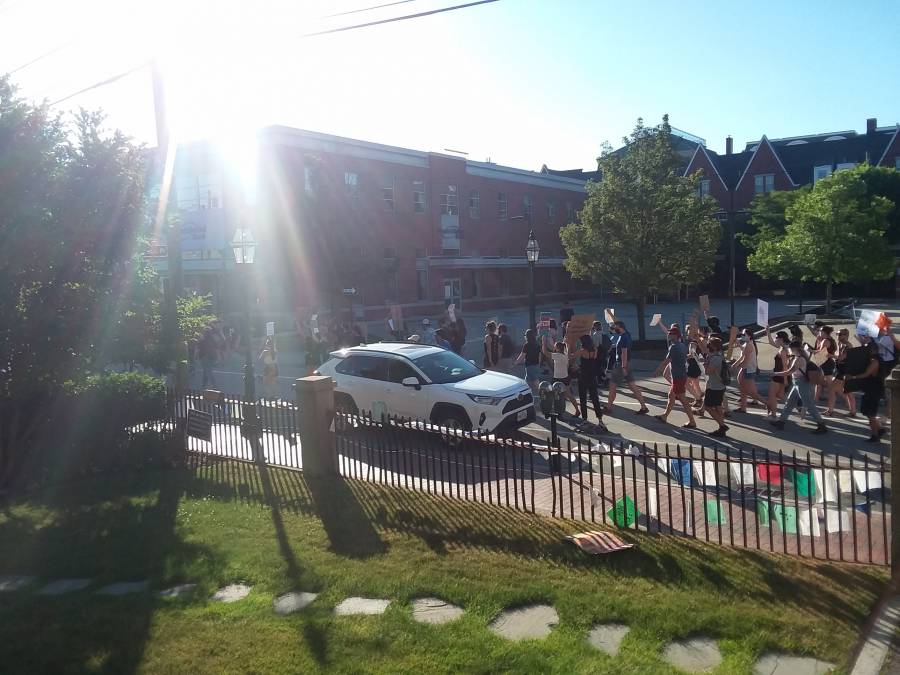
In Portsmouth, hundreds gathered in Prescott Park for a march through Market Square of Portsmouth. Food and water were provided by organizers, and local artists offered signs in exchange for donations to the Black Heritage Trail of New Hampshire. Starting around 6 pm, protesters took the streets in a show of force and solidarity, marching from Prescott Park to the African Burial Ground on Chestnut St where speakers discussed the state of the movement, and New Hampshire’s buried history of slavery, and segregation. In an interview with one of the speakers, who asked not to be named, it was discussed that 55 of 93 towns in New Hampshire had slaves, Portsmouth has a redlined district, and Wentworth By the Sea, a high end local resort, was not desegregated until 1964. She declared “We need to uncover the hidden histories and we need to right the wrongs.”
In Minneapolis at 38th and Chicago, the site of George Floyd’s killing, hundreds of people steadily streamed in to pay their respect. Mutual aid was all around both at 38th and Chicago, as well as the Northside Cub Foods. Stations were set up for families who needed toiletries, diapers, canned food, etc. The day was about coming together and supporting the real working class community. Community member Roby Ra told Liberation News: “I live Juneteenth every day of my life. Freedom is not free as an African-American, unfortunately. Justice is not a favor, it is a right.” Some younger participants did spoken word poetry and got the crowd into it. There was a feeling of youth led, elder supported activism.
A small group gathered at one of the busiest intersections in Provo, Utah during rush hour on June 19. They held banners and signs, receiving positive responses and honks from drivers.
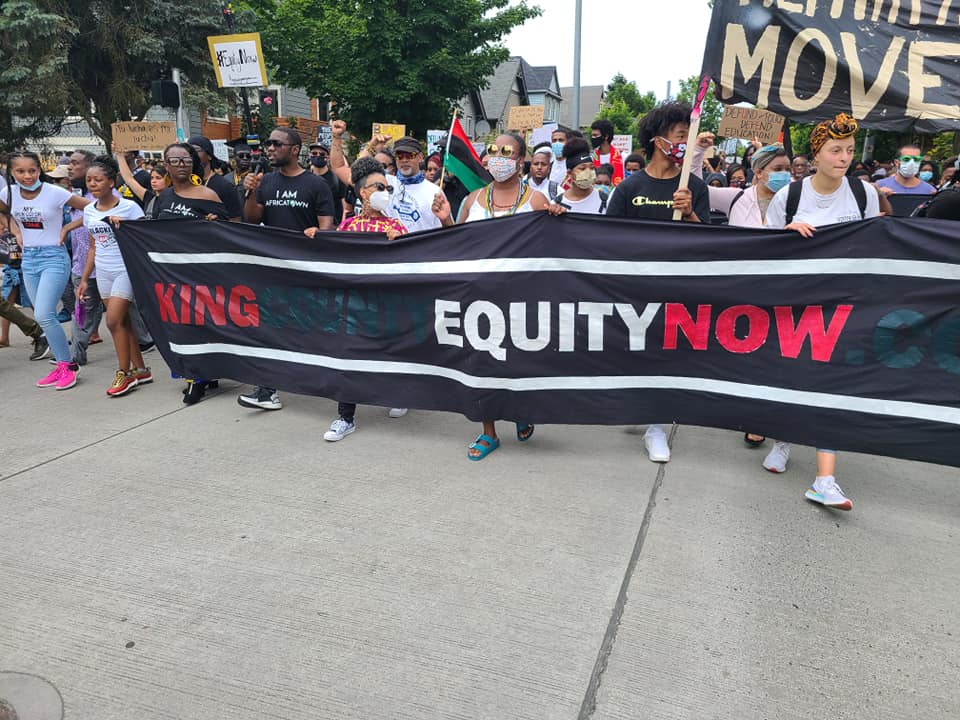
In Seattle, Washington, at least 5,000 people gathered for a rally and march hosted by the King County Equity Now Coalition at the corner of Madison and 22nd, outside of DeCharlene’s Beauty Salon. The late DeCharlene Williams was instrumental in bringing the Juneteenth celebration to Seattle nearly 40 years ago and founded the Central Area Chamber of Commerce. The theme of the “Freedom March” was “Take your knees off our necks.” The historically Black neighborhood has undergone significant gentrification, pushing Black families out of their community. The march stopped at key locations in the Central District and speakers explained their significance. There were several other Juneteenth marches in the greater Seattle area, including one in North Seattle and one in Everett, as well as the ILWU Port Shut Down march earlier in the day.
In San Jose, California, the Black Student Unions at William C. Overfelt High School and Santa Clara University coordinated a March in Solidarity for Black Lives. The march started at different points and ended with a rally at San José State University at the statues commemorating Tommie Smith and John Carlos raising their fists in the Black Power Salute at the 1968 Mexico City Olympics. Sixteen-year-old Phoenix LaFreniere sang “Stand up” to arouse the crowd, which had grown to several hundred after the City Hall demonstrators arrived. Some 50-60 high schoolers and community members had marched along the primary arteries of San José. They chanted for defunding the police, honoring George Floyd and Breonna Taylor, and for a united working class. Along the route, the police blocked the freeway entrances.
In Western North Carolina people came together on June 20 to participate in the annual Hillcrest Juneteenth celebration. The event was originally slated for the 19th but was rescheduled due to inclement weather. Several hundred people were in attendance for the day-long celebration that included bbq and live music. This annual celebration in the Hillcrest neighborhood has been taking place since 2011. The gathering goes from noon till around 9 pm and is a mix of eating, entertainment and activism. The atmosphere was especially heavy on issues of police brutality and community self-direction. The celebration was not only a space to reflect on recent events but also one for envisioning that a better world is possible. As one attendee said, “Juneteenth is a representation of what could be in America, but what we don’t see yet.”
Scores of protests and celebrations took place in all sections of New York City and in Northern New Jersey, some organized spontaneously, others by pre-existing or newly formed groups. The mass movement continues to bring youth into the struggle as leaders, demonstrated by a march of hundreds in the small town of Teaneck, NJ, organized by high-school students, or by a protest in Bushwick, Brooklyn, put together by young neighborhood Black people. Elected officials have felt compelled to join actions, such as Alexandria Ocasio-Cortez in Queens, but the struggle is still overwhelmingly organized and defined by working-class youth of color.
As in other recent actions, protestors have emphasized the intersection of racism, sexism, and transphobia. This was most visible in a “SayHerName” vigil in Prospect Park, Brooklyn, uplifting the stories of Black women, whose message focused on protecting all Black women from not only state violence, but also from an entire system pitted against them.
Commemorated were women such as Oluwatoyin Salau, a recently murdered Black Lives Matter activist. The sister of Layleen Polanco spoke at the vigil; Layleen died after Rikers Island prison officers left her in solitary while she was having a seizure for 47 minutes. The organizing of Black sex workers, by and for each other, was also uplifted in the protest.
About 500 protestors marched in Manhattan, surrounding City Hall and converging in Foley Square, a plaza surrounded by court buildings and the site of an African Burial Ground. Even in this New York hyper-gentrified neighborhood, the crowd was filled with young people of color from all parts of the city. PSL members were joined by allies from public housing, who are fighting against privatization and for much-needed repairs. Across the NYC area, members of the PSL both organized actions and supported others’ (for example providing sound systems, banners, placards, emceeing and leading chants).
Juneteenth protests continued on June 20 with a speak-out and die-in outside the Tombs, the notorious detention center in Manhattan. The crowd outside stood in solidarity with all victims of mass incarceration and uplifted the names and stories of George Floyd, Breonna Taylor, Akai Gurley, and countless other victims of police brutality. PSL member Shaniqua Pippen spoke about the unjust incarceration of her brother, Ronald Williams, explaining that the so-called criminal justice system is designed to go after and lock up working class Black and Brown people. She said, “The prison industrial complex is nothing more than a place for them to brutalize poor working class Black and Brown people in order to deal with the poverty issues created by capitalism.”
